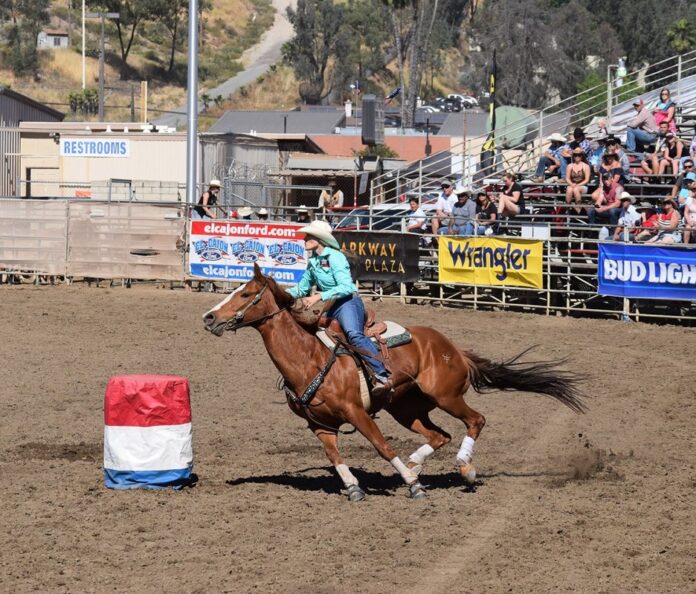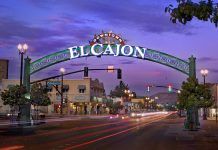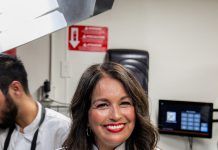
Let the competitions begin.
The El Capitan Stadium Association is back with its 49th annual Lakeside Rodeo April 27-30, bringing cowboys and cowgirls into the arena for four performances of non-stop action as they compete in bareback, saddle bronc, bull riding, barrel racing, tie-down roping, steer racing, and team roping, along with some specialty and signature events like the Kids Stick Horse Race.
With competitors from across the U.S., Mexico, and Canada competing in sanctioned Professional Rodeo Cowboys Association events, many are gathering points as they head to the National Finals Rodeo.
The ECSA is a nonprofit organization, and the Lakeside Rodeo is its largest fundraiser of the year to benefit local youth. They have donated more than $5.9 million since 1964 to the local community, said Lakeside Rodeo spokesperson Kathryn “Kate” Cunningham, who has volunteered with the ECSA for 32 years.
On Friday and Saturday night, the Leap Frogs – U.S. Navy Parachute Team—will be parachuting into the arena. The opening ceremonies will include Future Farmers of America students, 4-H students, and local youth groups participating in all opening ceremonies. All singers of the national anthem will be local school youth. Thursday, Jocelyn Lounsbery, Friday, Madison Marshall, Saturday, Emily Smith, and Sunday, Emma Jo Christman.
Performances on Thursday, Friday, and Saturday nights, the Southern California Youth Bull Riders will have short competitions, and the ECSA is sponsoring buckles for the winners.
“That will be before each of the PRCA rodeo performances,” she said. “Which is kind of cool because that is the youth bull riders that will be there on Sunday, literally PRCA bull riders. This year we also have the youth barrel racers, so not only will we have the WPRA barrel racers in our PRCA rodeo, but we will also have our ECSA youth qualifiers. That is bringing the youth that one day will be the contestant in the arena.”
Cunningham said the stock is looking great this year, (stock is scored as well in roughstock and judged events), with stock contractor Western Rodeo Company.
“What is really cool to me about Western Rodeo is the Simonides brothers,” she said. “Those boys have grown up. One is running the stock area for the rodeo. They have been involved since they were part of El Capitan High School. They kind of grew up at Lakeside Rodeo. They have worked with Western Rodeo off and on for years, and now these men are part of the stock contractor, but more important, they are part of us. It is great to see that bridge and that relationship.”
Cunningham, originally from Texas, said when she first began volunteering at the rodeo, she was so excited that she had “found a home” in a Lakeside rodeo. She met her husband at a rodeo in Texas.
“It took us two weeks to find a place we wanted to live, and we chose Lakeside,” she said. “Because literally standing there, it felt like home. And standing in the rodeo, it felt like home. For 32 years, it has been an amazing experience.”
Cunningham said she is really trying to get people to understand where the money goes.
“Nobody, from Jan. 1 to Dec. 31, unless you are a paid contractor, nobody gets paid,” she said. “We show up twice a month. We give away around $10,000 a meeting. If you go to a school and look around, there is something, there is someone, a process, an experience, a uniform, or equipment that we paid for.”
Cunningham said there are not many nonprofit rodeo facilities that work the entire year, renting out the facility, providing space for the youth to use without any costs, and work to raise money throughout the year to give away.
“The rodeo is critical to us as that is what we call our seed money for the beginning of the year,” she said. “We work hard at the rodeo, but then we work hard for the other 11 months of the year to raise additional funds. So, at the close of our business, we are able to say we gave out more than $100,000 in donations, funds, and resources. Some years we have given more than $200,000,” adding that the pandemic impacted them, but they were still there, providing funds to schools, teachers, youth.
These funds provide the school districts with additional funds that the district or state does not
provide.
“El Capitan gets an average of $50,000 a year from us,” she said. “When you look at other school districts you wonder who is paying for those warm-up uniforms, team uniforms, who is putting turf on that field again. In 1964, the premise of the ECSA was a football stadium. It was a brand new school. The district did not have the money. From there it grew facility-wise. We did the swimming pool, we did the baseball field. We owned the property the agricultural department sat on about 10 years ago and now it is the big infrastructure at the school. Those were massive contributions. A couple of years ago we were asked to help with the returfing of the football field. That was horrendously expensive.”
Cunningham said it is getting so expensive to provide a facility and education for the youth with just the basics.
“So, when it comes to the things that enrich these educational experiences for the students, that is where nonprofit groups need to step in and step up,” she said. “For the first 26 years of our existence, we focused only on El Capitan. About 1990, we included the Lakeside Union School District. The leadership here and the leadership at the high school sat down and said those students are coming in here, to us. So, we had to think what we could do to enrich their experiences so they would be ready when they got to El Capitan. It has been a wild ride.”













